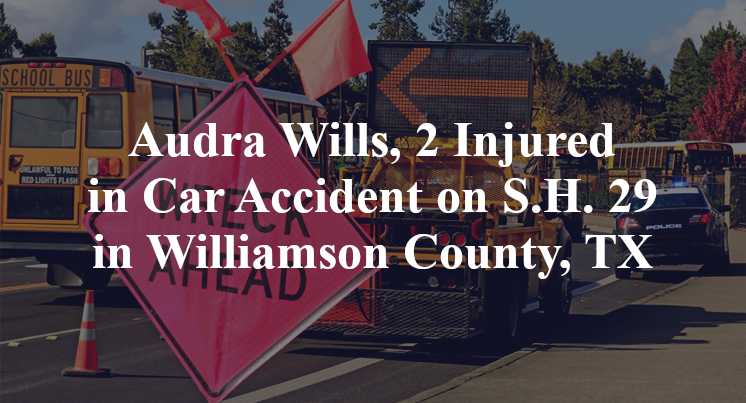Audra Wills, 2 Injured in Car Accident on S.H. 29 in Williamson County, TX
Georgetown, TX — January 22, 2025, Audra Wills and two others were injured in a car accident at approximately 6:30 p.m. along State Highway 29.
According to authorities, 28-year-old Audra Wills and a 28-year-old man were traveling in an eastbound Ford Explorer on S.H. 29 at the Lively Ranch Road intersection when the accident took place.

The cause of the accident remains unclear. Officials indicate that, for as yet unknown reasons, a westbound Mazda attempted a left turn to head south on Lively Ranch Road at an apparently unsafe time, failing to yield the right-of-way to oncoming traffic. This resulted in a collision between the Mazda and the Ford. Reports also state that the Mazda had driver assistance engaged at the time of the wreck.
Wills suffered reportedly serious injuries due to the wreck, while the man who had been with her in the Ford and the man from the Mazda sustained more minor injuries. Additional details pertaining to this incident are not available at this point in time. The investigation is currently ongoing.
Commentary by Attorney Michael Grossman
When I read about a crash like the one that left Audra Wills seriously injured, I know that many people will assume it was simply a case of driver error. While that’s certainly a possibility, my experience has shown me that crashes—especially those involving vehicles with driver assistance features—are often more complex than they first appear. Instead of making assumptions, it’s important to ask the right questions to ensure that all possible contributing factors are explored. To that end, there are three critical questions that need to be considered.
First, did the authorities conduct a thorough investigation? When a vehicle makes a turn at an unsafe time, investigators should determine why. Did law enforcement collect statements from any available witnesses or check for nearby surveillance cameras that may have captured the accident? Did they examine the roadway for any obstructions or visibility issues that could have affected the driver’s ability to react? If the driver assistance system was engaged, did investigators account for how it may have influenced the events leading up to the crash? The quality of the investigation will determine whether all possible explanations are explored or if key details are overlooked.
Second, has anyone looked into whether a vehicle defect contributed to the crash? Driver assistance systems are designed to enhance safety, but they are not foolproof. Did the system fail to detect oncoming traffic? Was there a malfunction in the vehicle’s sensors, braking system, or acceleration controls? If the driver attempted to override the system but it did not respond appropriately, that could be a crucial factor in understanding how the crash occurred. Unfortunately, these types of failures are rarely examined unless someone specifically requests a forensic vehicle inspection. If the vehicle is quickly repaired or scrapped, any evidence of a defect may be lost before it can be analyzed.
Lastly, have investigators gathered all available electronic data? Most modern vehicles, particularly those with driver assistance features, are equipped with event data recorders (EDRs) that capture crucial details such as speed, braking, steering inputs, and system engagement at the time of the crash. This data could help clarify whether the driver or the automated system was in control at the time of impact. Additionally, if any nearby traffic cameras recorded the crash, that footage could provide further context. If this evidence isn’t secured quickly, it may become unavailable, making it harder to determine the full circumstances of the accident.
At the end of the day, answering these questions could be essential to understanding what really happened and why. A thorough examination of all three of these issues—including the quality of police investigations, possible vehicle defects, and electronic data—is the least that can be done to ensure that those affected by the crash receive the clarity they deserve.

*We appreciate your feedback and welcome anyone to comment on our blog entries, however all visitor blog comments must be approved by the site moderator prior to showing live on the site. By submitting a blog comment you acknowledge that your post may appear live on the site for any visitors to see, pending moderator approval. The operators of this site are not responsible for the accuracy or content of the comments made by site visitors. By submitting a comment, blog post, or email to this site you acknowledge that you may receive a response with regard to your questions or concerns. If you contact Grossman Law Offices using this online form, your message will not create an attorney-client relationship and will not necessarily be treated as privileged or confidential! You should not send sensitive or confidential information via the Internet. Since the Internet is not necessarily a secure environment, it is not possible to ensure that your message sent via the Internet might be kept secure and confidential. When you fill out a contact or comment form, send us an email directly, initiate a chat session or call us, you acknowledge we may use your contact information to communicate with you in the future for marketing purposes, but such marketing will always be done in an ethical way.